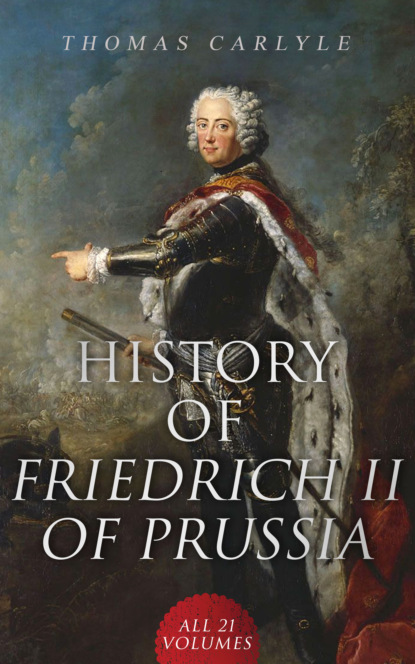PRINCESS WHILHELMINA'S FOUR KINGS AND OTHER INEFFECTUAL SUITORS.
Chapter IV. — DOUBLE-MARRIAGE PROJECT IS NOT DEAD.
CROWN-PRINCE FRIEDRICH WRITES CERTAIN LETTERS.
DOUBLE-MARRIAGE PROJECT RE-EMERGES IN AN OFFICIAL SHAPE.
HIS MAJESTY SLAUGHTERS 3,602 HEAD OF WILD SWINE.
FALLS ILL, IN CONSEQUENCE; AND THE DOUBLE-MARRIAGE CANNOT GET FORWARD.
Chapter V. — CONGRESS OF SOISSONS, SIXTH CRISIS IN THE SPECTRE-HUNT.
Chapter VI. — IMMINENCY OF WAR OR DUEL BETWEEN THE BRITANNIC AND PRUSSIAN MAJESTIES.
CAUSE FIRST: THE HANOVER JOINT-HERITAGES, WHICH ARE NOT IN A LIQUID STATE.
CAUSE SECOND: THE TROUBLES OF MECKLENBURG.
CAUSES THIRD AND FOURTH:—AND CAUSE FIFTH, WORTH ALL THE OTHERS.
TROUBLES OF MECKLENBURG, FOR THE LAST TIME.
ONE NUSSLER SETTLES THE AHLDEN HERITAGES; SENDS THE MONEY HOME IN BOXES.
Chapter VII. — A MARRIAGE: NOT THE DOUBLE-MARRIAGE: CROWN-PRINCE DEEP IN TROUBLE.
CROWN-PRINCE'S DOMESTICITIES SEEN IN A FLASH OF LIGHTNING.
Chapter VIII. — CROWN-PRINCE GETTING BEYOND HIS DEPTH IN TROUBLE.
Chapter IX. — DOUBLE-MARRIAGE SHALL BE OR SHALL NOT BE.
WILHELMINA TO BE MARRIED OUT OF HAND. CRISIS FIRST: ENGLAND SHALL SAY YES OR SAY NO.
DUBOURGAY STRIKES A LIGHT FOR THE ENGLISH COURT.
WILHELMINA TO BE MARRIED OUT OF HAND. CRISIS SECOND: ENGLAND SHALL HAVE SAID NO.
WILHELMINA TO BE MARRIED OUT OF HAND. CRISIS THIRD: MAJESTY HIMSELF WILL CHOOSE, THEN.
HOW FRIEDRICH PRINCE OF BAIREUTH CAME TO BE THE MAN, AFTER ALL.
BOOK VI. — DOUBLE-MARRIAGE PROJECT, AND CROWN-PRINCE, GOING ADRIFT UNDER THE STORM-WINDS. — 1727–1730.
Chapter I. — FIFTH CRISIS IN THE KAISER'S SPECTRE-HUNT.
The Crown-Prince's young Life being, by perverse chance, involved and as it were absorbed in that foolish question of his English Marriage, we have nothing for it but to continue our sad function; and go on painfully fishing out, and reducing to an authentic form, what traces of him there are, from that disastrous beggarly element—till once he get free of it, either dead or alive. The WINDS (partly by Art-Magic) rise to the hurricane pitch, upon this Marriage Project and him; and as for the sea, or general tide of European Politics—But let the reader look with his own eyes.
In the spring of 1727, War, as anticipated, breaks out; Spaniards actually begin battering at Gibraltar; Kaiser's Ambassador at London is angrily ordered to begone. Causes of war were many:
1. Duke de Ripperda—tumbled out now, that illustrious diplomatic bulldog, at Madrid—sought asylum in the English Ambassador's house; and no respect was had to such asylum: that is one cause.
2. Then, you English, what is the meaning of these war-fleets in the West Indies; in the Mediterranean, on the very coast of Spain? We demand that you at once take them home again:—which cannot be complied with.
3. But above all things, we demand Gibraltar of you:—which can still less be complied with. Termagant Elizabeth has set her heart on Gibraltar: that, in such opportunity as this unexpected condition of the Balances now gives her, is the real cause of the War.
Cession of Gibraltar: there had been vague promises, years ago, on the Kaiser's part; nay George himself, raw to England at that date, is said to have thought the thing might perhaps be done.—"Do it at once, then!" said the Termagant Queen, and repeated, with ever more emphasis;—and there being not the least compliance, she has opened parallels before the place, and begun war and ardent firing there; [22d February, 1727 (Scholl, ii. 212). Salmon, Chronological Historian (London, 1747; a very incorrect dark Book, useful only in defect of better), ii. 173. Coxe, Memoirs of Walpole, i. 260, 261; ii. 498–515.] preceded by protocols, debates in Parliament; and the usual phenomena. It is the Fifth grand Crisis in the Kaiser's spectre-huntings; fifth change in the color of the world-lobster getting boiled in that singular manner;—Second Sputter of actual War.
Which proved futile altogether; and amounts now, in the human memory; to flat zero—unless the following infinitesimally small fraction be countable again:—
"Sputtering of War; that is to say, Siege of Gibraltar. A siege utterly unmemorable, and without the least interest, for existing mankind with their ungrateful humor—if it be not; once more, that the Father of TRISTRAM SHANDY was in it: still a Lieutenant of foot, poor fellow; brisk, small, hot-tempered, loving, 'liable to be cheated ten times a day if nine will not suffice you.' He was in this Siege; shipped to the Rock to make stand there; and would have done so with the boldest—only he got into duel (hot-tempered, though of lamb-like innocence), and was run through the body; not entirely killed, but within a hair's breadth of it; and unable for service while this sputtering went on. Little Lorry is still living; gone to school in Yorkshire, after pranks enough, and misventures—half-drowning 'in the mill-race at Annamoe in Ireland,' for one. [Laurence Sterne's Autobiography (cited above).] The poor Lieutenant Father died, soldiering in the West Indies; soon after this; and we shall not mention him again. But History ought to remember that he is 'Uncle Toby,' this poor Lieutenant, and take her measures!—The Siege of Gibraltar, we still see with our eyes, was in itself Nothing."
Truly it might well enough have grown to universal flame of War. But this always needs two parties; and pacific George would not be second party in it. George, guided by pacific Walpole, backed by pacific Fleury, answers the ardent firing by
